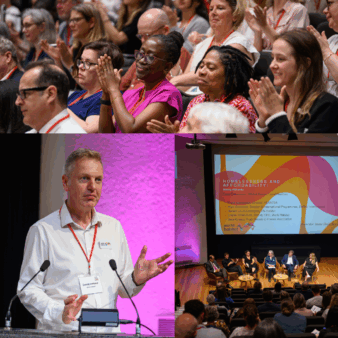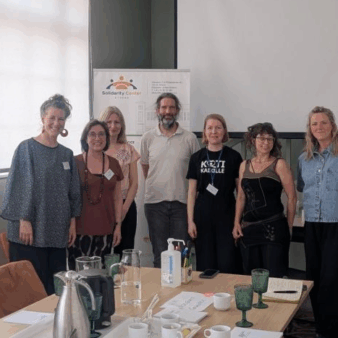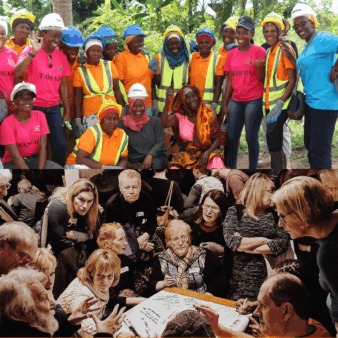
Following three years of deliberations and concerted efforts by civil society and community-based organisations, Rio de Janeiro’s new Master Plan was adopted on 11 December 2023, and includes provision for Community Land Trusts (CLTs). This represents a critical victory for the favelas of Rio, housing activists, and advocates for a fairer development model in cities across the world.
It also marks a significant milestone for community led housing. The Community Land Trust model (residents collectively own and manage land via a democratic and participatory institution, providing security of tenure and housing affordability) is now recognised in and supported by Rio de Janeiro’s most important urban development policy framework. It will feature in the strategies, policies and planning tools that will guide the city’s development for the next 10 years.
The importance of Community Land Trusts to favelas and informal settlements
Almost one-in-four of Rio de Janeiro’s population lives in favelas, informal settlements constructed by their residents within or on the outskirts of Brazil’s large cities. Favelas provide homes to rural-to-urban migrants and other groups unable to access adequate affordable housing. Their development is linked to land and housing inequality. Favela residents, known as favelados, also experience exploitation and discrimination for living in these communities.
Historically unregulated, neglected by government authorities and often unfairly associated with crime and poverty, favelas are in fact thriving communities of solidarity, with a long history of community-led forms of governance. Favelados invest a major part of their savings and time building and upgrading their homes and neighbourhoods, creating and running their businesses, and operating various social and cultural activities. However, with no formal property rights and a lack of institutional recognition, residents are subject to the threat of evictions and relocation, not least because of land value speculation. In this context, collective forms of land ownership and management, such as CLTs, hold great promise to secure the livelihoods and life-long investment of people, often over several generations, in their homes and their communities.
Working across communities, civil society actors, and policy makers
Taking inspiration from the 2015 World Habitat Award winner, Caño Martín Peña Community Land Trust, Catalytic Communities established the Favela Community Land Trust project (Favela CLT) in August 2018, to introduce and adapt CLTs (known in Brazil as Termo Territorial Collectivo or TTC) to Brazil’s favelas.
Catalytic Communities, who have decades of experience working in Rio’s favelas, saw the revision of Rio’s Master Plan as a strategic opportunity to actively shape urban planning and advance community-led housing into policy. In a participatory process, legally required to engage civil society, the organisation was able to play a key role in mobilising popular support for including provisions for the CLT model in the plan, following a heavily amended draft that sought to remove them.
This ground-breaking victory underscores the power of Catalytic Communities’ three-fold strategy.
1. Meaningfully engage with and learn from communities and the grassroots
Favela CLT has organised numerous community mobilisations, training events, and awareness activities in the Trapicheiros, Esperanca, Vila Autódromo, Shangri-lá and Terra Prometida favelas. They work with local residents, listening to their concerns and guided by their vision for the future of their communities.
2. Raise awareness and leverage broader civil society support
Through public campaigns and awareness raising activities, Favela CLT has created a broad coalition in support of CLT, uniting citizens and professionals including planners, architects, lawyers, researchers, social housing activists, public servants, among other agents.
3. Monitor the policy landscape and effectively respond to policy-shaping opportunities
Finally, the organisation’s policy-focused workstream has been instrumental in drafting policy proposals and identifying opportunities for change.
Community Land Trusts in Rio de Janeiro’s Master Plan
- The ‘Community Land Trust’ model is officially enrolled in the list of the city’s urban instruments, aimed at ensuring access to housing and land.
- Key elements of the CLT model are defined, such as the separation of the ownership over land and housing.
- Provision of affordable housing is defined as one of the main objectives of the CLT, along with improving the security of tenure of urban communities.
- CLTs must have a majority of local residents in their board of directors.
- The model cannot be imposed on favelas and other urban communities, it depends on the acceptance of local residents.
- Community Land Trusts will be preferably implemented in Zones of Special Social Interest, which are already identified for social housing according to the Master Plan.
Secure and affordable homes in thriving communities
Although the implementation of the CLT model does not require a specific law – Brazilian legislation already contains the key tools to enable it – the legal provisions for the model will facilitate its use and provide more security for communities already applying it. Crucially, having CLTs as part of the city’s urban planning allows the city to consider it alongside other tools, instruments and resources, to help overcome one of the biggest challenges in its implementation of the model: the acquisition of land. Recognising and securing CLTs into policy, creates the conditions for the creation of Community Land Trusts and for people to lead the development of housing in their communities.
The approach of Catalytic Communities working across communities, civil society and the policy sphere, so vital in this victory, offers valuable lessons for all working to make urban policies and planning fairer.
We hope that Rio’s Master Plan, advancing self-governance and participatory practices in the context of informal settlements, is an inspiration for others facing similar challenges; a call to actively engage and work with policies that make residents the protagonists in the development of their cities.




Join the discussion